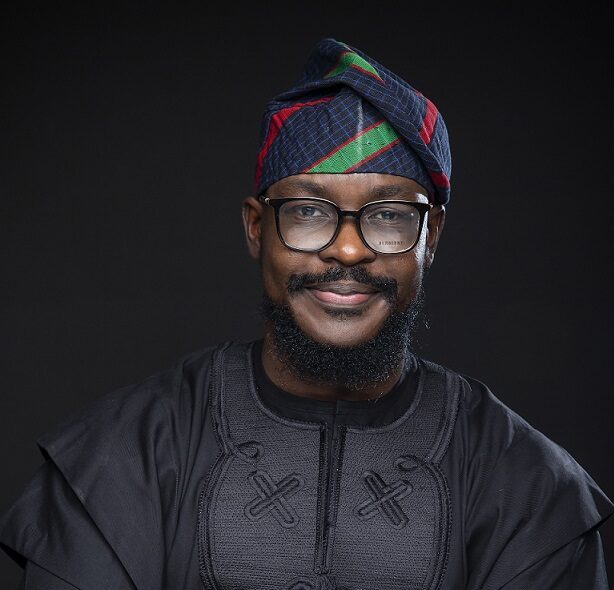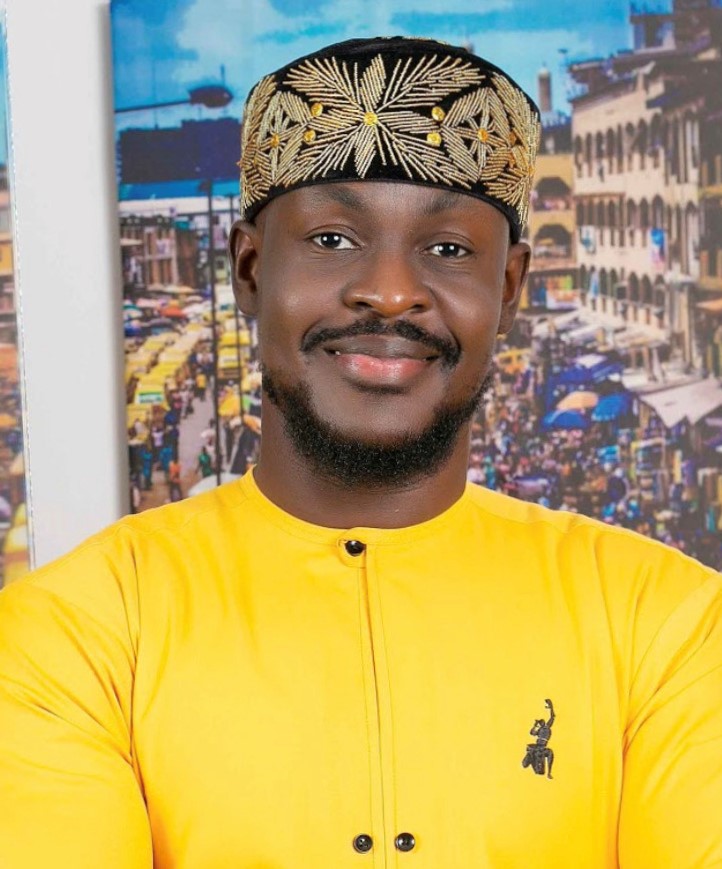Meet Dr. Bada Akintunde. The Co-founder of Africa Creative Market.

Can you tell us about your journey in the media, music, and marketing communications industry and how it led you to your current role as Country Manager for Paramount Africa in Nigeria?
I started out on TV as a presenter and producer with Galaxy TV many years ago. I always knew I wanted more and desired to explore my creative side. Subsequently, I joined TBWA Concept as a copywriter, which was one of the most awarded and respected agencies at the time. From there, I moved to CentrespreadFCB, top ad agency at the time, as senior manager Copy. Later, I joined HITV as the Creative Manager for three years. After that, I took on the role of the Creative director for Glo at SO&U Saatchi&Saatchi for four years before assuming my current position as the Country Manager at Paramount.
The connection between being a creative leader and a business leader, as I am at Paramount, stems from my involvement in various ventures. I co-founded a digital marketing agency, Distinct Ideas Africa Limited. I also co-ran a talent management company in collaboration with a partner. What qualified me for this role was my deep understanding of how media works, informed by experience as both an employee and an entrepreneur.
I had two radio shows that ran every weekday for many years – “Final Score” on City FM 105.1 and a football hangout with Bada on Radio Continental. In these roles, I was not only responsible for creating and presenting content but also crucially involved in selling and marketing them. I built critical media agency relationships across major agencies and directly with brands/clients, understanding the language and intricacies vital for a business like Paramount that has a linear business that feeds off advertising revenue. My leadership skills have served me well in this role, and I’ve been in this position for six years now.
As a mentor with the Academy for Women Entrepreneurs, what advice do you have for aspiring entrepreneurs, especially women, in the creative industry?
The advice is straightforward: be prepared for the challenges. Nigeria poses a difficult operating environment for any business, but it’s also a place where your business can thrive rapidly. If you expected a smooth ride without bumps or turbulence, you’d be deceiving yourself. Prepare to be resilient, be ready to go the extra mile – your endurance will be your greatest asset. It’s not just about your ability to run a business, inspire people, or attract clients; resilience is one attribute that will keep you in business for long.
Despite the unfriendly economic conditions, finding a way is imperative. For me, resilience is the crucial quality a business owner needs because challenges are constant. However, persisting through them yields incredible rewards. Successfully running a business in Nigeria means you can do well in any other business environment globally. Those who achieve this feat should be regarded as superheroes and awarded for their accomplishments in my opinion. It is far from easy at all.

How do you see the role of technology and digital platforms in shaping the future of the Nigerian creative sector?
We can all agree that the growth and evolution of the creative sector in the developed world has primarily been driven by technology over the years. Take music, for example – we’ve progressed from cassettes to CDs, and now, there’s no need for physical items; just your phone and a subscription on a streaming platform allow you to access an unlimited library of music from all over the world. This technological shift extends to every facet of the creative industry, from film and dance to spoken word to fashion, photography, name it. Technology is transforming everything; we’re now delving into virtual stores for fashion, where you can go online and try out an outfit of your body size without needing to go to a physical store .
Technology is the lifeblood and heartbeat of this industry. Everyone in this space must embrace technology in both their creative processes and distribution methods, enhancing the overall experience for end consumers. Running away from technology isn’t an option, and there’s immense potential if entrepreneurs leverage the opportunities it provides. My advice to business owners is simple: recognize that the game is global, stay aware of trends that reshape the landscape, especially those game-changers, embrace them, and employ local and native intelligence to adapt them to our unique environment. Doing so will undoubtedly yield abundant benefits.
Could you share some insights on the challenges and opportunities you’ve encountered while managing a music talent management and production services company like Peaceville Africa?
One challenge in the music industry is its high cost; nowadays, it’s almost a rule of thumb that you can’t effectively market or promote a song without spending 40 to 50 million naira. This includes expenses for shooting music videos, promoting on radio, TV, clubs, and even taking it to the streets. It’s a substantial financial investment with no guarantees, making it quite challenging. However, if you navigate these challenges wisely, there are opportunities for incredible benefits, particularly if you achieve global superstar status like Wizkid, Davido, Rema, Asake, Ayrastar, Burna Boy, or Tems. The potential is vast, but the challenges are equally daunting, requiring a delicate balance.
In terms of my unique experience managing talents, working with A-Class stars presents its own set of difficulties. One of the most challenging aspects is ensuring they adhere to the agreed-upon plan. Occasionally, artists might show up at private events for extra earnings, which can conflict with their brand image. As a talent manager, maintaining brand consistency is crucial, and it’s an ongoing struggle. Nevertheless, these experiences serve as valuable lessons. Each encounter enhances our understanding and equips us better to work with talents. We remain committed to advising them and implementing global practices to facilitate their continual improvement.
With your experience in both advertising and music, how do you navigate the intersection of creativity and business in the entertainment industry?
In merging the worlds of advertising and music, navigating the interplay of creativity and business in the entertainment industry is akin to orchestrating a finely tuned symphony. It involves harmonising the distinct melodies of creative expression and financial pragmatism.
From the advertising realm, I’ve honed the art of crafting compelling narratives and visuals that not only capture a brand’s essence but also engage audiences effectively. Meanwhile, my experiences in the music industry underscore the need for a strategic approach, considering budgets, market dynamics, and the unpredictable nature of the field.
The challenge lies in seamlessly aligning creative vision with business objectives. It’s about creating campaigns and music projects that not only showcase artistic brilliance but also resonate commercially. This requires constant collaboration with artists, marketers, and industry stakeholders for a cohesive and effective strategy.
My approach at this intersection revolves around creating a synergy where artistic endeavours thrive creatively and contribute to the bottom line. It’s a dynamic process that demands adaptability and a keen awareness of the ever-evolving entertainment landscape, aiming to produce impactful projects resonating on both creative and commercial wavelengths.
As a co-founder of Africa Creative Market, what impact do you hope to make in terms of training, mentorship, and collaboration opportunities for local creators in Nigeria and beyond?
In my role as a co-founder of Africa Creative Market, our mission revolves around making a substantial impact in terms of training, mentorship, and collaborative efforts for local creators in Nigeria and beyond. We envision a dynamic and flourishing ecosystem where creators have the opportunity to enhance their skills, receive valuable mentorship, and engage in collaborative initiatives.
Training is a cornerstone of our approach, aiming to provide creators with the tools, knowledge, and insights necessary to navigate the intricacies of the creative industry. Through targeted training programs, we seek to equip them with the expertise needed to not only hone their craft but also to adapt to the evolving landscape of the creative sector.
Mentorship is another crucial aspect of our initiative. We believe in the power of guidance and shared experiences. By connecting seasoned mentors with emerging talents, we aim to provide a support system that goes beyond formal education, offering practical advice, industry insights, and a roadmap for personal and professional growth.
Collaboration lies at the heart of our vision. We aspire to create a collaborative environment where creators can synergize their talents, exchange ideas, and work together on innovative projects. This not only enriches the creative process but also opens up new avenues for creators to showcase their work to a broader audience, both locally and globally.
Our ultimate goal is to foster a community that thrives on the principles of learning, mentorship, and collaboration. By doing so, we believe we can contribute significantly to the development of a robust and globally competitive creative industry in Nigeria and beyond, empowering creators to reach new heights of success and recognition.
How do you balance your academic pursuits, such as studying for an MBA, with your professional responsibilities and creative endeavours?
Balancing academic pursuits, including my MBA studies, with professional responsibilities and creative endeavours involves effective time management and prioritisation. Juggling the demands of academia and work requires careful planning to ensure each commitment receives due attention. Additionally, as a co-founder of Africa Creative Market, integrating this initiative into my schedule involves aligning its goals with my academic and professional pursuits, creating a cohesive approach that contributes to both personal and collective growth.
If you could have any superpower, what would it be and how would you use it to enhance the creative industry?
If I could have any superpower, it would be the ability to inspire boundless creativity in others and provide the tools and world class infrastructure necessary to nurture talent to international levels of competence across the length and breadth of Africa. I would use it to fuel innovation, collaboration, and elevate the entire creative industry by fostering a continuous wave of fresh ideas and artistic expression that are commercially viable here and in international markets.
If you were stranded on a deserted island and could only have one album to listen to, which one would it be and why?
If stranded on a deserted island, I would definitely listen to Asa’s self-titled album Asa. It has to be one of the most complete bodies of work by a Nigerian Artiste in history. Wizkid’s Superstar and Wande Coal’s Mushin to Mohits will come close to being my pick as well.










